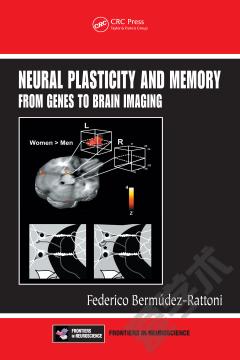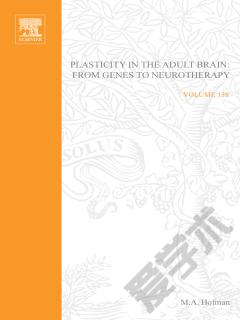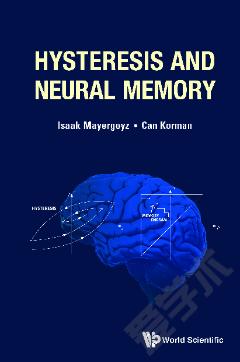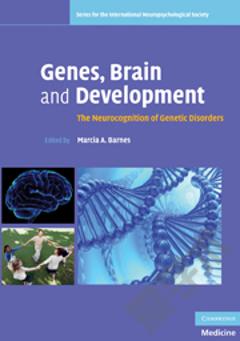Neural Plasticity and Memory —— From Genes to Brain Imaging
----- 神经可塑性与记忆
SEARCHING FOR MEMORY IN THE BRAIN: CONFRONTING THE COLLUSION OF CELLS AND SYSTEMS, J.L. McGaugh One Hundred and Fifty Years of Controversy The Great Debate: What is Learned - Knowledge or Responses? Brain Systems and Forms of Memory Brain Systems and Memory Functions. Cells and Systems Two Centuries of Progress in Research on Brain and Memory References LONG-TERM POTENTIATION AND DEPRESSION AS PUTATIVE MECHANISMS FOR MEMORY FORMATION, M.L. Escobar and B. Derrick Introduction Long-Lasting Forms of Synaptic Modification: A Methodological Approach LTP and LTD: Triggering, Expression, and Maintenance Mechanisms Persistent Synaptic Plasticity: A Metaplastic Point of View The Role of Activity-Dependent Synaptic Plasticity in Brain Function Substrates of LTP and LTD - Structural Plasticity Neurotrophins and Synaptic Plasticity Experience-Dependent Modifications - Is LTP Involved in Learning and Memory? Outstanding Questions and New Directions MOLECULAR MECHANISMS OF SYNAPTIC PLASTICITY UNDERLYING LONG-TERM MEMORY FORMATION, V. Ramirez-Amaya Early Signals. Ca2+ and its transducer Immediate early genes. Trophic Factors. Conclusions MODIFICATION OF BRAIN CIRCUITS THROUGH EXPERIENCE, M.R. Rosenzweig Brain Plasticity Discovered through Serendipity Unexpected Discovery of Brain Plasticity Cerebral Effects of Experience Occur in All Species Tested Enriched Environments and the Brain Neurochemical Cascades Underlie Modification of Neural Circuits Acknowledgments References PRESYNAPTIC STRUCTURAL PLASTICITY AND LONG-LASTING MEMORY: FOCUS ON THE LEARNING-INDUCED REDISTRIBUTION OF HIPPOCAMPAL MOSSY FIBERS, J.L. Rekart, M.R. Holahan, and A. Routtenberg Learning And Structural Plasticity Hippocampal Granule Cell Axon Terminals And Learning Mechanisms Of Presynaptic Structural Plasticity The Presynaptic Disparity: Anti-Boutonism or a Biological Reality? ELECTROPHYSIOLOGICAL REPRESENTATION OF TASTE MEMORY, T. Yamamoto and Y. Yasoshima Introduction CTA paradigm Enhanced response to the CS Alteration of responses reflecting hedonic shift CS-US association Importance of amygdala in CTA formation Involvement of reward system Summary CHANGES IN NEUROTRANSMITTERS EXTRACELLULAR LEVELS DURING MEMORY FORMATION, M.I. Miranda Introduction The Free Moving Microdialysis Technique Acetylcholine Release During Motor Activity, Attention, and Novelty Novelty and Other Neurotransmitter Release Lesions and Blockade of Cholinergic Activity During Memory Formation Acetylcholine and Long Term Memory Tasks Noradrenaline Release During Memory Formation Glutamate and GABA Release During Memory Formation Conclusions REVERSIBLE BRAIN INACTIVATION OF BRAIN CIRCUITS IN LEARNING AND MEMORY RESEARCH, M. Gallo Introduction The Brain Lesion Approach and the Dynamic Nature of Learning and Memory Systems Reversible Inactivation Techniques Learning Behavioral Models and Reversible Inactivation Techniques Dissociating Independent Learning and Memory Processes Summary ENHANCED LEARNING PROTECTS THE BRAIN AGAINST THE EFFECTS OF AMNESIC TREATMENTS, R.A. Prado-Alcala, R. Salado-Castillo, C. Quiroz, M.E. Garin-Aguilar, A. Diaz-Trujillo, S. Rivas-Arancibia, and G.L. Quirarte Introduction Protective Effect of Enhanced Training Two Models Conclusions References STUDIES ON SHORT-TERM AVOIDANCE MEMORY, M. Cammarota, L.R.M. Bevilaqua, J.H. Medina, I. Izquierdo Summary Introduction STM and LTM: Parallel or Sequential? The Role of the Hippocampus in Avoidance STM and LTM The Role of the Entorhinal Cortex in Avoidance STM and LTM The Role of Other Cortical Areas and of the Amygdala in IA's Memory Neurobiological Separation of Short and Long Term Avoidance Memory STM and LTM are Behaviorally Different The Biochemistry of Short Term Memory Pharmacological Analysis of IA's Working Memory Conclusions References MEMORY RECONSOLIDATION OR UPDATING CONSOLIDATION? C.J. Rodriguez-Ortiz and F. Bermudez-Rattoni Abstract The Consolidation Hypothesis The Reconsolidation Era On the Restraints of the Reconsolidation Hypothesis Are Consolidation and Reconsolidation the Same Process? The Reconsolidation Hypothesis Reconsidered: The Updating Consolidation Proposal Acknowledgments References MEMORY IMPAIRMENTS ASSOCIATED WITH STRESS AND AGING, C. Sandi The Concept Of Stress The Physiological Stress Response Stress And Memory Function Acute Stress And Memory Impairment Neurobiological Mechanisms Involved In The Acute Effects Of Stress On Memory Impairing Effects Of Chronic Stress On Cognitive Function Neurobiological Mechanisms Involved In The Deleterious Effects Of Chronic Stress On Brain And Behavior Stress And Aging Aging Memory Deficits In The Aging Human Population Neurobiological Mechanisms Associated To Age-Related Cognitive Decline In Humans Memory Deficits In Aged Rodents Aging And Structural And Functional Plasticity Conclusions References ADRENAL STRESS HORMONES AND ENHANCED MEMORY FOR EMOTIONALLY AROUSING EXPERIENCES, C.K. McIntyre and B. Roozendaal Introduction Stress Hormone Effects on Memory Consolidation Stress Hormones Selectively Enhance Memory Consolidation of Emotionally Arousing Experiences Involvement of the Amygdala in Mediating Stress Hormone Effects on Memory Consolidation Role of Emotional Arousal-Induced Noradrenergic Activation Within the Amygdala in Enabling Epinephrine and Glucocorticoid Effects on Memory Consolidation Conclusions NEURO-IMMUNE ASSOCIATIVE LEARNING, G. Pacheco-Lopez, M.-B. Niemi, H. Engler, and M. Schedlowski. Abstract Introduction Phenomenon: The Association Between Exteroceptive and Immune Stimuli Theoretical Framework for Neuro-Immune Associative Learning Neurobiology of Neuro-Immune Associative Learning Biological Relevance of Neuro-Immune Associative Learning Clinical relevance of neuro-immune associative learning Summary and future perspective References HUMAN BRAIN IMAGING STUDIES OF EMOTIONAL MEMORY: UNCOVERING INFLUENCES OF SEX AND HEMISPHERE, L. Cahill Abstract Introduction The Amygdala-- Built to Modulate Human Subject Studies Relating Amygdala Activity to Emotional Memory An Aside on Sex Differences in the Brain Sex-Related Influences on the Amygdala Relation to Memory for Emotional Events Sex Difference in Human Amygdala Functional Connectivity at Rest Potential Relationship of the Sex-Related Amygdala Hemispheric Specialization to Hemispheric Global/Local Processing Bias Some Implications for Disease States Summary
{{comment.content}}








 京公网安备 11010802027623号
京公网安备 11010802027623号